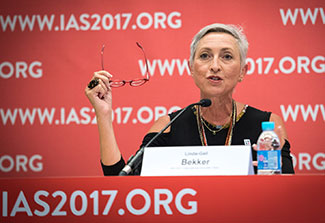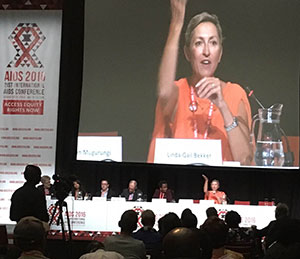Q and A with former Fogarty trainee, Dr Linda-Gail Bekker, President of the International AIDS Society
September / October 2017 | Volume 16, Issue 5

Photo (c) IAS/Steve Forrest/Workers' Photos
Linda-Gail Bekker, MBChB, DTMH, DCH, FCP(SA), PhD
Dr. Linda-Gail Bekker began a two-year term as president of the
International AIDS Society in 2016, after years of working as a physician-scientist focused on HIV, tuberculosis and related diseases. Born in Zimbabwe, Bekker did her undergraduate and postgraduate medical training in South Africa, and completed her Ph.D. in the United States with Fogarty support. Dr. Bekker currently serves on the Steering Committee of the
Adolescent HIV Prevention and Treatment Implementation Science Alliance (AHISA), coordinated by the Center for Global Health Studies at Fogarty.
She is a professor of medicine at the University of Cape Town, deputy director of the
Desmond Tutu HIV Centre at the university's Institute of Infectious Disease and Molecular Medicine, and chief operating officer of the Desmond Tutu HIV Foundation, a nonprofit that works to improve the well-being of people from some of South Africa's poorest communities.
NIH funds fantastic research and Fogarty backs this up with excellent capacity building. Thinking that we can do research without good training, without building scientific capacity is wrong and in many ways deluded. The two go hand in hand.
Dr. Linda-Gail Bekker
What impact has Fogarty had on your career?
Fogarty funded my Ph.D., which I see as the foundation of my research career. At the time, in the late 1990s, there were few options in South Africa for stepping out of a clinical career and going into research. It's only because I had Fogarty support that I was able to go to an amazing hall of learning, Rockefeller University in New York, to do my Ph.D. There, my horizons expanded logarithmically. I found a world of research that it would have taken me years to discover if I'd stayed in South Africa - if I'd discovered it there at all. It's impossible to put a price on the opportunity Fogarty gave me.
After I completed my Ph.D., I came back to South Africa, where I've been a researcher ever since. With my husband, I now run a research organization called the Desmond Tutu HIV Center, which employs some 400 people who do a variety of clinical and implementation science research projects in South Africa. We've accessed a variety of Fogarty opportunities, including a small grant that allowed us to bring implementation science fellows into our organization. This was a great opportunity to build the capacity of young people. Fogarty's investment may appear to be in a few individuals in a small country in the global south, but the ramifications for public health are felt worldwide.
How has Fogarty helped advance global HIV research?
NIH funds fantastic research and Fogarty backs this up with excellent capacity building. Thinking that we can do research without good training, without building scientific capacity is wrong and in many ways deluded. The two go hand in hand, and HIV illustrates this in the most extraordinary way. In 30 years, we've taken the worldwide HIV epidemic, which could have killed 78 million people, and through excellent clinical, basic and translational research, have brought it pretty much under control. It's through science and research that we've arrived at this extraordinary place in a very short space of time, in large part because of the amazing commitment of the U.S. and its ability to channel money into good science and good translational work.
What role does U.S. support play in the fight against HIV?
U.S. funding for programs like PEPFAR (the President's Emergency Plan for AIDS Relief), research opportunities through the NIH and Fogarty-supported training have literally changed lives, not only in low-income countries but also in the U.S. I've met HIV-infected mothers who've been able to raise their children; breadwinners who have been able to continue to support their families. I've seen great science being done around the world because of the amazing generosity of the U.S. We're all looking to build a world where we understand each other better, tolerate each other better, and U.S. support for training and research helps to make that kind of world a reality - one where we get on a lot better, one that has less disease and where we can go about our lives in ways that most people want to.

Photo courtesy of the Desmond Tutu HIV Foundation
How do you see the future of HIV/AIDS?
My husband and I have a 15-year-old son and I imagine that, one day, he'll walk in a world where HIV is no longer a threat. We're going in the right direction, but if we don't walk quickly and resolutely down that road, we could lose all the gains we've made in the first 30 years of the fight against HIV.
Research has a key role to play in achieving that. Let's take the story of the automobile as an example. We didn't make the first car and then stop working on that original design. Cars have changed and grown over the years, and no one thinks we should stop improving on them. Health care is the same. Public health requires us to constantly be finding new solutions, sometimes to the same old problems, but in many cases to new problems that come around the corner and require an innovative approach. To stop funding research now would not only be a tragedy, but would take us back further than we were a few years ago.
More Information
To view Adobe PDF files,
download current, free accessible plug-ins from Adobe's website.